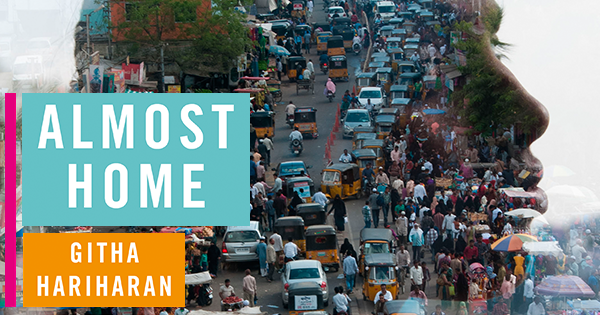
Go to a party or a bar in the United States, and a typical question strangers ask each other is: “So, what do you do?” In India, as Githa Hariharan writes in her new book, the first thing people ask is, “What is your native?”
That question—or its more common variant, “Where are you from?”—is at the heart of Almost Home, a collection of essays about finding a place in the world when you’re not exactly from a single place. Hariharan, who now lives in New Delhi, has spent her life traversing the borders of cities around the world, from New York to Bangalore. Her home, she writes, is “Anycity, a composite city of visible cities, remembered cities, imaginary cities”—like the Manila and Bombay she grew up in, cities with equally malleable identities.
Almost Home reads like a palimpsest, with languages and locations bleeding through one another to form a layered portrait of “a person with too many cities in her life.” Read an excerpt from Hariharan’s account of returning to Japan in 2003, three decades after she visited the islands as a teenager.
While sitting by the sea—this time not gathering shells that would need another plastic bag—I thought of my Bombay in the seventies, and my Japan-in-Bombay of the time; and the real life Japan I was now looking at through the cloudy windowpane of a language I did not know. The multilingual mess of a Bombay childhood should have prepared me better for the tricks language plays on travelers, both at home and elsewhere. But only now, all these years later, I felt, with full force, the impossibility of living in a world without translation.
Received wisdom has any number of gloomy precepts about the loss of translation: that it is merely an echo; that the best part is lost in translation. In India in particular, given the vexed relationship between English and the other Indian languages, many people like to insist that an English equivalent can never be found for this or that word in Marathi, or Kannada, or Bengali. Happily, there are the imaginative takes on translation as well; not only on its necessity and the wonderful accidents it sometimes leads to; but on the fundamental relationship between original and translation as being somewhat akin to the relationship—shaky but essential—between dream and waking life. The expert on all such convoluted matters, Borges, said the original is unfaithful to the translation. I liked this when I was in Japan. I liked thinking that if I looked through the windowpane of translation, I could see that boundaries were not rigid, that knowledge and idea and beauty did not have a home anywhere in particular, not even the “west.” It helped me see the ways in which science and ideas, story and food, traveled to make knowledge and culture at various intersections in India or Egypt or Iraq or the Mediterranean or Greece or Spain.
The petty details of real life travel in our times do not always let us see translation at its most heroic, though. Perhaps we should give up our little word-and-phrase guidebooks, I thought. Perhaps the haiku, with its impressionist exchanges, is the best mode of speech when you need to acknowledge both the happy and unhappy accidents of translation.
Excerpted from Almost Home: Finding a Place in the World from Kashmir to New York. Copyright © 2016 by Githa Hariharan. Reprinted by permission of Restless Books. All Rights Reserved

